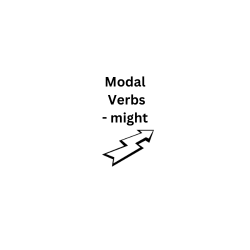Modal Verbs: might

Modal Verbs: might
Might with the Indefinite Infinitive:
Might with the indefinite infinitive is used to express possibility or uncertainty in the present or future.
Examples: I might go to the gym later.
(possibility)
He might need some help with his project.
(uncertainty)
Might can also be used to make polite requests, similar to may.
Example: Might I borrow your pen, please?
(polite request)
Might with the Continuous tenses:
Might can be used with continuous tenses to express possibility or uncertainty over a period of time.
Examples: She might be studying for her exam right now. (possibility over a period of time)
They might be having trouble finding the restaurant. (uncertainty over a period of time)
Might in Negative form:
In negative form, might not is used to indicate that something is not possible or likely.
Examples: We might not be able to finish the project on time.
(not possible)
He might not come to the party tonight.
(not likely)
Might with the Perfect Infinitive:
In the perfect infinitive form, might have is used to express possibility or uncertainty in the past.
Examples: She might have missed the train this morning. (possibility in the past)
They might have forgotten to bring the key with them. (uncertainty in the past)
Might in Subordinate clauses:
Might can be used with the indefinite infinitive in subordinate clauses to express purpose or intention.
Examples: She saved money so that she might travel to Europe next summer.
(purpose)
He is working hard so that he might get a promotion. (intention)
In all of these cases, might is used to indicate possibility, uncertainty, purpose or intention, depending on the context.
Might in Conditional sentences:
Might can be used in conditional sentences to express a hypothetical or uncertain outcome. Here are some examples:
First conditional with might:
In the first conditional, might is used in the if-clause to express a possibility or uncertainty, and the main clause expresses the consequence or result.
Example: If it rains tomorrow, we might stay at home. (possibility or uncertainty in the if-clause, consequence in the main clause)
Second conditional with might:
In the second conditional, might is used to express a hypothetical situation in the if-clause, and the main clause expresses the consequence or result.
Example: If I won the lottery, I might buy a new car. (hypothetical situation in the if-clause, consequence in the main clause)
Third conditional with might:
In the third conditional, might is used to express a hypothetical situation in the past and the consequence or result that could have happened.
Example: If we had left earlier, we might have caught the train.
(hypothetical situation in the past in the if-clause, consequence in the main clause)
In all of these examples, might is used to express a hypothetical or uncertain outcome in a conditional sentence.
click here Modal Verbs: might
click here Modal Verbs: may
click here Modal Verbs: could
click here Modal Verbs: can
click here Modal Verbs: ought to
click here Modal Verbs: need
click here Modal Verbs: must
click here Modal Verbs: to be
click here Auxiliary Verbs: should and would
click here Auxiliary Verbs: shall and will
click here Auxiliary Verbs: to have
click here Auxiliary Verbs: to be
click here Auxiliary and Modal verbs